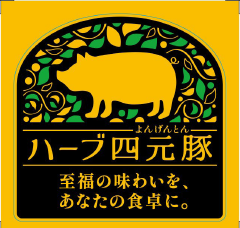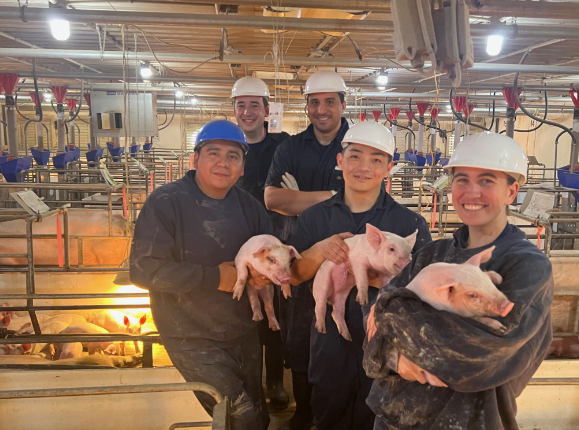How Herb Yongenton Pork Made a Silky Sequel for our Food Business
Sumitomo Corporation has been a key player in the imported pork business since the 1990s, introducing the Yongenton Silky Pork® brand in 2010. This high-grade pork, known for its tender, juicy, cherry-blossom-pink flesh, and subtle, sweet fat layer, quickly became a favorite among Japanese consumers. Sumitomo’s commitment to strict Japanese standards of pork production and a meticulous traceability system has ensured the product’s consistent quality and freshness. As a result, sales grew, with major buyers including mass market retailers and restaurant chains. The introduction of high-grade imported pork brands like Yongenton Silky Pork® was a strategic move to change the Japanese perception of imported pork. However, by 2021, rising costs and supply instability prompted the need for a new brand.

Now, Sumitomo Corporation and Sumitomo Corporation of Americas are set to launch a new pork brand, “Herb Yongenton,” aiming to offer another high-quality and affordable alternative to domestically produced pork. SCOA’s Motoki Tamura and Hitoshi Fujita (pictured above) were instrumental in SCOA’s Food Division developing this new brand for market.
“We had to adapt to changing market conditions and consumer preferences. The launch of Herb Yongenton is a testament to our commitment to innovation and quality,” Tamura said.
Since 2021, Tamura has overseen the pork export business as well as new business development at SCOA, leading negotiations with U.S. suppliers, joint development efforts, and establishing a robust production system for the new brand. Hitoshi Fujita, who joined the company in 2015, has worked extensively in the food industry. Currently assigned to SC Foods, Fujita is responsible for proposing new brands, marketing in Japan, and developing sales channels in collaboration with industry professionals of SC Foods. These two became the dynamic duo of pork brand development, ready to release Herb Yongenton as their pride and joy.
Fujita emphasized the importance of maintaining a stable supply of imported pork, which constitutes about half of Japan’s pork consumption. “We knew that discontinuing the brand was an option. Instead, we decided to enhance it. Our new brand, Herb Yongenton, builds on the success of Yongenton Silky Pork®, offering even better taste and nutritional value,” Fujita explains, underlining the significance of the new development.
Herb Yongenton is produced through a unique crossbreeding process with four breeds of pig that includes the use of herbs in the feed. The Duroc pig breed, known for its marbling quality, is incorporated twice in the breeding process, differentiating Herb Yongenton from other brands.
“This special breeding process, combined with additional herb feeding, results in a high-end product that is both rare and exceptional,” Tamura said.

Above: Fujita explains the cuts of pork. Through involvement in the production process and a deep understanding of these products, Fujita can promote the project from the same perspective as SC Foods’ partners.
Fujita added that taste tests conducted by a third-party agency confirmed Herb Yongenton’s superior taste, tenderness, marbling, and nutritional value compared to previous products. “A taste test showed that this pork outperforms our previous Yongenton product in terms of taste and flavor. It’s more tender, has stronger marbling, a less distinct odor, and is juicier and more nutritious,” Fujita revealed. Additionally, the brand offers competitive pricing, making it an attractive alternative to domestic pork brands.
The collaboration with Clemens Food Group (CFG) in the U.S. was crucial for the brand’s development. Tamura noted that CFG’s meticulous livestock management and traceability reassured Sumitomo Corporation of their ability to meet the high-quality standards required by the Japanese market. “We approached CFG about a joint development project. Their farm, with carefully managed rearing environments, gave us confidence in their ability to provide a stable supply of high-quality products,” Tamura recalled.
The specific crossbreeding process was determined through repeated taste tests and discussions, ensuring the best possible product. “We worked closely with CFG, conducting taste tests repeatedly to determine the optimal cross breeding combinations. It was a meticulous process, but the results speak for themselves,” Tamura added.

The Herb Yongenton Pork logo
Fujita highlighted the innovative “Diary Survey” conducted by SC Foods, which provided deep insights into consumer preferences and helped shape the brand’s development and marketing strategies. “We asked sixteen households about their pork purchases, delving into the emotional and psychological factors influencing their choices,” Fujita explained. “This information was invaluable in developing a product that truly resonates with consumers.
The development process was not without its hurdles. Tamura recalled the initial reluctance from CFG to engage in joint development. “When we first approached CFG, they were not so positive. We had to carefully explain the brand’s positioning in the Japanese market and our vision for the brand development. It took time, but we eventually reached an agreement,” Tamura said.
The journey from collaboration to the first shipment took about two years, requiring patience and commitment from both parties. “It was a long process, but we believed in the potential of this product. CFG shared our vision and was highly motivated to work with us,” Tamura states. This perseverance and collaboration were key to bringing Herb Yongenton to market.
Fujita admitted feeling pressured by the challenge of working with seasoned professionals in the imported meat business. “I felt the weight of responsibility, knowing I had to live up to the high standards set by our veteran team members. But through hard work and constant communication, I was able to contribute effectively,” Fujita says, acknowledging the personal growth and teamwork involved in the project.
Fujita expressed his commitment to providing consumers with high-quality, affordable pork, especially in the face of rising global prices. “It’s rewarding to know that we’re delivering a product that not only tastes great but is also affordable. Our focus is always on the consumer, ensuring they get the best value,” Fujita asserted, emphasizing the consumer-oriented approach of the project. He also reflected on the broader impact of their work.

“The meat industry is something everyone can relate to. It’s motivating to see how our products make a difference in people’s lives.”
Tamura shared his pride and sense of responsibility in maintaining the Sumitomo Corporation Group’s foundational role in the food business. “The imported pork market accounts for more than half of all pork consumed in Japan. We take great pride in our role in this industry and are committed to upholding the highest standards,” Tamura stated, underscoring the company’s commitment to quality.
“Our goal is to deliver products that not only meet but exceed customer expectations,” Fujita said. “We are always looking for ways to innovate and improve.”
“Working in the U.S. taught me the value of mutual respect and open communication,” Tamura emphasized, noting the importance of dialogue with partners to develop better products.
“It’s through these principles that we can create products that truly stand out. Being part of this project has been an incredible journey. I’ve learned so much about the intricacies of the pork industry and the importance of maintaining high standards.”
